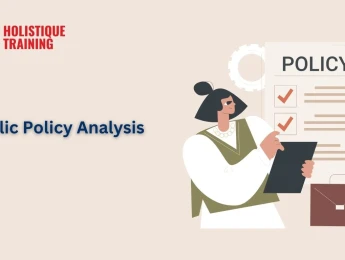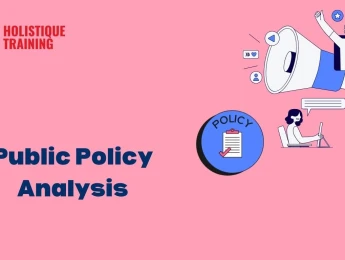This comprehensive course bridges the gap between Environmental, Social, and Governance (ESG) principles and public policy development. With an increasing global focus on sustainable practices, this program offers insights into integrating ESG factors into public governance and creating effective, socially responsible, and environmentally sustainable policies. Participants will learn how to navigate the complexities of ESG within the context of public administration and governance, ensuring their policies meet global standards and local needs. Understanding the critical role of ESG in today's policy landscape will empower participants to drive meaningful change in their organisations and communities.
Upon completion of this course, participants will be able to:
- Understand the core principles of ESG and their relevance to public policy.
- Analyse global trends and best practices in ESG integration.
- Develop and implement public policies that reflect ESG considerations.
- Assess the impact of ESG policies on governance and administration.
- Create strategies for effective stakeholder engagement and communication regarding ESG issues.
- Evaluate and measure the success of ESG-driven policies through practical tools and methodologies.
This course is intended for:
- Public policymakers and government officials.
- Environmental and social governance professionals.
- Corporate social responsibility (CSR) managers.
- Sustainability officers.
- Regulatory affairs specialists.
- Anyone involved in policy development, governance, and administration seeking to integrate ESG principles into their work.
The course employs a mix of lectures, case studies, interactive discussions, and practical exercises to ensure a thorough understanding of ESG integration in public policy. Participants will engage in group work, simulations, role-playing, and workshops to apply theoretical concepts to real-world scenarios. Guest speakers from leading organisations will share insights, and participants will undertake practical projects to solidify their learning. This hands-on approach will equip attendees with the skills and knowledge to develop and implement ESG-driven policies effectively.
Day 5 of each course is reserved for a Q&A session, which may occur off-site. For 10-day courses, this also applies to day 10
Section 1: Introduction to ESG and Public Policy
- Overview of ESG principles and their significance.
- The intersection of ESG and public policy.
- Case studies on successful ESG integration in public governance.
- Interactive session: A group discussion on current ESG policies.
Section 2: Global Trends and Best Practices
- Examine global ESG frameworks and standards (e.g., UN SDGs, GRI).
- Comparative analysis of ESG policies in different regions.
- Lessons learned from international ESG initiatives.
- Workshop: Developing a regional ESG policy framework.
Section 3: Policy Development with ESG Integration
- Steps to incorporate ESG considerations in policy-making.
- Tools and methodologies for ESG policy analysis.
- Stakeholder mapping and engagement strategies.
- Role-playing exercise: Stakeholder negotiation and engagement.
Section 4: Governance and Administration
- Impact of ESG on governance structures and administrative processes.
- Risk management and compliance in ESG-focused policies.
- Building resilient institutions through ESG principles.
- Case study analysis: ESG governance models.
Section 5: Measuring and Communicating ESG Impact
- Key performance indicators for ESG policy success.
- Reporting and communication strategies for transparency.
- Continuous improvement and innovation in ESG policies.
- Practical exercise: Designing an ESG impact report.
Upon successful completion of this training course, delegates will be awarded a Holistique Training Certificate of Completion. For those who attend and complete the online training course, a Holistique Training e-Certificate will be provided.
Holistique Training Certificates are accredited by the British Assessment Council (BAC) and The CPD Certification Service (CPD), and are certified under ISO 9001, ISO 21001, and ISO 29993 standards.
CPD credits for this course are granted by our Certificates and will be reflected on the Holistique Training Certificate of Completion. In accordance with the standards of The CPD Certification Service, one CPD credit is awarded per hour of course attendance. A maximum of 50 CPD credits can be claimed for any single course we currently offer.
- Course Code IND17-108
- Course Format Classroom, Online,
- Duration 5 days













